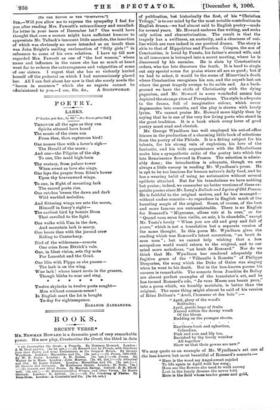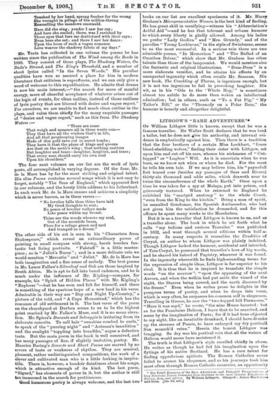BOOKS.
RECENT VERSE.*
Mn. NEWMAN HOWARD is a dramatic poet of very remarkable power. His new play, Constantine the Great, the third in date • (1) Constantine the Great: a Tragedy. By Newman Howard. London : J. M. Dent and Co. [4s. 6d. net.] —(2) Ronsard and La Pleiade, with Selections from their Poetry and Some Translations in tits Original Metres. By George -Wyndham. London : Macmillan and Co. [5s. net.]—(3) Poems, 1899-100B. By W. B. Yeats. London : A. H. Bullen. f6s. net.]—(4) Poems. By Walter de In Mare. London : John Murray. [3s. 6d. net.]—(5) Silverleaf and Oak. By Lance Fallaw. London : Macmillan and Co. [Ss. (6) Durante and Setvaggia. By Kaufmann Spiers. London : D. Nutt. 28.1 —(7) Sonnets and Short Poems. By Maurice Baring. Oxford : B. H. Black- welt. [2s. net.]—(8) Misrepresentative Women, and other Verses. By Harry Graham. London : E. Arnold. [581-01 The Crackling of Thom. By bum-bum. London : A. Constable and Co. [38. 6d. net.] of publication, but historically the first, of his "Christian Trilogy," is to our mind by far the most notable contribution to English drama—we had almost said to English poetry—made
for several years. Mr. Howard eschews fine writing, and seeks only action and characterisation. The result is that the tragedy has a swiftness, an austerity, and a clearness of out- line which are rare indeed in our poetical drama. The story is akin to that of Hippolytus and Phaedra. Crispns, the son of Constantine, is loved by Fausta, his father's second wife, and in all innocence is betrayed into a secret meeting, where he is discovered by his enemies. He is slain by Constantine's orders, who too late discovers the truth. It is hard to single out any special scene for praise where all are so good ; but if we had to select, it would be the scene of Minervina's death where Constantine recognises his son, and the superb last act where the great tragedy sweeps to its noble end. As a back-
ground we have the strife of Christianity with the dying paganism, and Mr. Howard in some wonderful scenes lies depicted the strange rites of Persephone. The style is adequate to the drama, full of imaginative colour, which never
degenerates into conceits, and the play is strewn with lovely lyrics. We cannot praise Mr. Howard more highly than by saying that he is one of the very few living poets who stand in the great tradition. It is a book which every lover of good poetry must read and cherish.
Mr. George Wyndham has well employed his out-of-office leisure in the production of a charming little book of selections from the poetry of the Pleiade. It is a fitting subject for his talents, for his strong vein of euphuism, his love of the fantastic, and his wide acquaintance with the Ehzabethans make him a sympathetic critic of the poetry into which the late Renaissance flowered in France. The selection is admir- ably done ; the introduction is adequate, though we are always a little uneasy in reading Mr. Wyndham's prose. He is apt to be too luscious for human nature's daily food, and he has a wearing habit of using no substantive without several
epithets attached. But for his translations we have nothing but praise; indeed, we remember no better versions of these ex- quisite poems since Mr. Lang's Ballads and Lyrics of Old France.
He is faithful to the original metres, and he has managed— without undue conceits—to reproduce in English much of the haunting magic of the original. Some, of course, of the best and more famous are untranslateable. There is no English for Ronsard's "Mignonne, allons voir si la rose," or for " Quand vous serez bien vieille, an soir, k la chandelle," except Mr. Yeats's lovely "When you are old and grey and full of years," which is not a translation but a separate version of the same thought. In this poem Mr. Wyndham gives the reading which was Ronsard's latest correction, "au bruit de mon nom "; but we cannot help wishing that a less scrupulous world would return to the original, and to our mind more melodious, "au bruit de Ronsard." Nor do we think that Mr. Wyndham has rendered adequately the fugitive grace of the "Villanelle 1 Rosette" of Philippe Desportes, the song which the Duke of Guise was singing when he went to his death. But in the less-known poems his success is remarkable. The sonnets from Joachim du Bellay are almost perfect examples of the translator's art, and he has turned Ronsard's ode, " Je veux Muses aux beaux yeux," into a poem which, we humbly maintain, is better than the original. The same thing might almost be said of his version of Remi Belleau's " Avril, rhonneur et des bole" :— "April, glory of the wood's Solitudes;
April, gentle hope of fruits
Nursed within the downy womb Of the bloom Budding on the younger shoots.
Hawthorn-bush and eglantine, Celandine, Pink and rose and lily too, Ravished by thy lovely weather All together
Show us that their gowns are new."
We may quote as an example of Mr. Wyndham's art one of the less-known but most beautiful of Ronsard's sonnets :- "Here is the wood my Angel-sweet cajoled To life again in April with her song; Here are the flowers she used to walk among Lost in the lonely dreams she never told. Here is the field whose tender green and gold,
Touched by her hand, sprang fresher for the wrong She wrought in pillage of the million-throng Enamelling the meadows emerauld.
Here did she slag; yonder I saw her cry; And here she smiled; there, was I ravished by Those eyes that lure me deathward with their rays : Even here she sat; and there I saw her dance: Upon the loom of such a vague romance Love weaves the shadowy fabric of my days."
Mr. Yeats has collected in one volume the poems he has written since the publication of The Wind among the Reeds in 1899. They consist of three plays, The Shadowy Waters, On Baile's Strand, and The King's Threshold, and a number of short lyrics called "In the Seven Woods." His peculiar qualities have won so assured a place for him in modern literature that criticism is superfluous, and we can only give a word of welcome to this republication. He admits that drama is now his main interest,—" the search for more of manful energy, more of cheerful acceptance of whatever arises out of the logic of events, for clean outline, instead of those outlines of lyric poetry that are blurred with desire and vague regret." For ourselves, we are unable to find much clean outline in the plays, and value them chiefly for the many exquisite passages of "desire and vague regret," such as this from The Shadowy
Waters :— " There are some
That weigh and measure all in these waste seas— They that have all the wisdom that's in life,
And all that prophesying images • Made of dim gold rave out in secret tombs ; They have it that the plans of kings and queens Are dust on the moth's wing ; that nothing matters
But laughter and tears—laughter, laughter, and tears; That every man should carry his own soul Upon his shoulders."
The four next volumes on our list are the work of lyric poets, all accomplished in varying degrees. Of the four, Mr. de la Mare has by far the most striking and original talent. His slim Poems contains several songs which it is not easy to forget, notably "The Seas of England," which appeared first in our columns, and the lovely little address to his fatherland. In such work Mr. de la Mare ensues and achieves a simplicity which is never barren, as in these verses :— " No lovelier hills than thine have laid My tired thoughts to rest ;
No peace of lovelier valleys made Like peace within my breast.
Thine are the woods whereto my soul, Out of the noontide beam, Flees for a refuge green and cool And tranquil as a dream."
The other side of his art is seen in his "Characters from Shakespeare," which reveal an extraordinary power of painting in small compass with strong, harsh touches fan- tastic but living portraits. " Falstaff " is a little master- piece ; so is "Juliet's Nurse" ; and in a more delicate vein we would mention " Mercutio" and "Juliet." Mr. de hi. Mare has both imagination and a fine sense of melody. The best poems in Mr. Lance Fallaw's Saverleaf and Oak are those inspired by South Africa. He is apt to fall into banal cadences, and he is much under the influence of Mr. Kipling—compare, for example, his "Spirit of Hidden Places" with Mr. Kipling's "Explorer "—but he has seen and felt for himself, and there is something of the spacious hope of a new land in his verse. Admirable in their way are "Day and Night Up-Country," a picture of the veld, and "A Cape Homestead," which has the romance of old settlement in it. The last verse of the poem on the churchyard at Durban seems to us to be the highest point reached by Mr. Fallaw's Muse, and it is no mean eleva- tion. Mr. Spiers's Durante and Selvaggia is irritating from its elaborate conceits. To call hair "sunshine combed to curls," to speak of the "purring night" and "Autumn's inaudition " and the sunlight "toppling into breadths," argue a defective taste. But the main poem in the book is well conceived, and has many passages of fine, if slightly imitative, poetry. Mr. Maurice Baring's Sonnets and Short Poems are marred by no errors of taste or weakness of rhythm. They are musical, pleasant, rather undistinguished compositions, the work of a elever and cultivated man who is a little lacking in inspira- tiOn. There is, however, a boudoir daintiness about his songs, which is attractive enough of its kind. The last poem, "Sigurd," has elements of power in it, but the author is still too immersed in the search for prettinesses.
Good humorous poetry is always welcome, and the last two books on our list are excellent specimens of it. Mr. Harry Graham's Misrepresentative Women is the best kind of fooling. He has great skill in versifying—witness his "Abbreviation's Artful Aid "—and he has that tolerant and urbane humour to which every liberty is gladly allowed. Among his ladies we prefer "Lady Godiva " and "Mrs. Grundy," and of the parodies "Young Lochinvar," in the style of Swinburne, seems to us the most successful. In a serious vein there are two admirable poems, "In Memoriam" and "The Ballad of an Omnibus Driver," which show that Mr. Graham has other talents than those of the lampoonist. We would mention also the fantastic and original illustrations. "Dam-Dues" is a more elaborate versifier, and he attains his effects by an unexpected ingenuity which often recalls Mr. Seaman. His new book, The Crackling of Thorns, is ingenious enough, but it is not too ingenious to fail in provoking laughter. His wit, as in his "Ode to the 'Whole Hog,'" is sometimes almost too subtle to do more than waken an intellectual admiration; but in others, such as "To a Fat Pig," "My Tailor's Bill," or the "Threnody on a Polar Bear," the humour is homely and altogether delightful.



























































 Previous page
Previous page